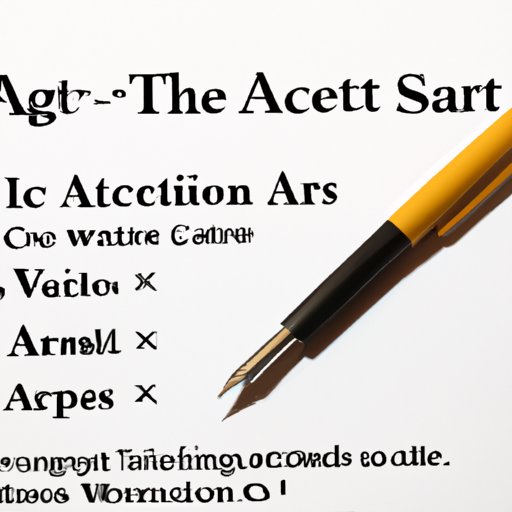Introduction
The ACT is an important benchmark exam that many students take to showcase their academic aptitude and help them gain admission into college or university. The ACT includes four sections: English, Math, Reading, and Science, but there is also an optional Writing section. For those who are considering taking the ACT with Writing, this article will explore the benefits of doing so, as well as provide tips on how to prepare for the test.
Is the ACT Writing Section Necessary?
Some colleges and universities require applicants to submit a score from the ACT with Writing. Therefore, it’s important to research which schools on your list of potentials require the test. If none of the schools on your list require the Writing section, then it may not be necessary to take the test with Writing. However, if some of the schools on your list do require the Writing score, then it’s worth considering taking the ACT with Writing.
Taking the ACT with Writing has its advantages and disadvantages. On the one hand, it can give you more time to demonstrate your writing skills and provide insight into how you think and express yourself. On the other hand, it takes up additional time and requires extra preparation. It’s important to weigh the pros and cons and decide if taking the ACT with Writing is the best option for you.
Tips for Preparing for the ACT Writing Section
If you decide to take the ACT with Writing, the key to success is preparation. Here are some tips for getting ready for the test:
- Research the Topics Covered in the Test: Make sure you understand the topics covered in the ACT Writing section. Knowing the types of questions that are likely to be asked can help you prepare for the test.
- Practice Sample Questions: Familiarize yourself with the format of the ACT Writing section by practicing sample questions. This will help build your confidence and ensure that you are prepared for the test.
- Utilize Online Resources: There are many online resources available to help you prepare for the ACT Writing section. Use these resources to practice writing essays and get feedback on your work.

What to Expect on the ACT Writing Test
The ACT Writing section is composed of one essay question. You will have 40 minutes to complete the essay. The essay prompt will ask you to analyze an issue and present your opinion on the topic. You will need to support your opinion with examples and evidence from your own experience or knowledge.
Your essay will be scored based on four criteria: Ideas and Analysis, Development and Support, Organization, and Language Use and Conventions. Each criteria will be scored on a scale of 1-6, with 6 being the highest score. Your overall score will be the average of the four criteria scores.

Strategies for Scoring Well on the ACT Writing Section
To score well on the ACT Writing section, it’s important to employ effective strategies. Here are a few tips for success:
- Develop a Solid Essay Structure: A well-structured essay is essential for achieving a high score. Make sure your essay has an introduction, body paragraphs, and a conclusion.
- Employ Evidence-Based Arguments: To support your opinion, use evidence from your own experience or knowledge. This will help strengthen your argument and make your essay more convincing.
- Trim Unnecessary Content: Before submitting your essay, make sure you have trimmed any unnecessary content. This will help you maximize your score by ensuring that you are only including relevant information in your essay.
Conclusion
Taking the ACT with Writing can be beneficial for those who are applying to schools that require the Writing score. It’s important to research which schools on your list require the Writing score and decide if it’s worth taking the test with Writing. With proper preparation and employing effective strategies, you can maximize your score on the ACT Writing section and increase your chances of gaining admission into your school of choice.
(Note: Is this article not meeting your expectations? Do you have knowledge or insights to share? Unlock new opportunities and expand your reach by joining our authors team. Click Registration to join us and share your expertise with our readers.)
